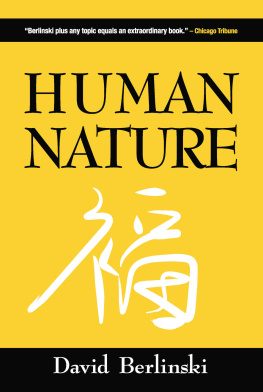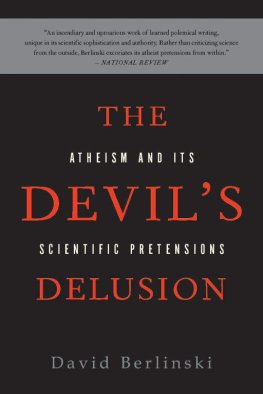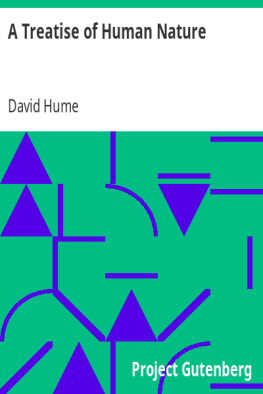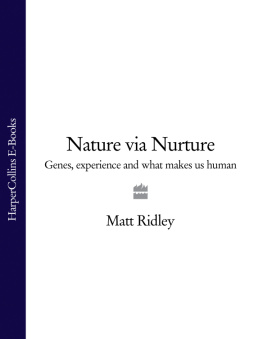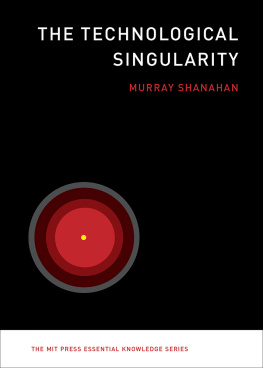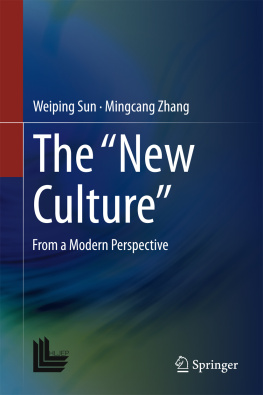HUMAN NATURE
HUMAN NATURE
DAVID BERLINSKI
SEATTLE DISCOVERY INSTITUTE PRESS 2019
Description
Conventional wisdom holds that the murder rate has plummeted since the Middle Ages; humankind is growing more peaceful and enlightened; man is shortly to be much improvedbetter genes, better neural circuits, better biochemistry; and we are approaching a technological singularity that well may usher in utopia. Human Nature eviscerates these and other doctrines of a contemporary nihilism masquerading as science. In this wide-ranging work polymath David Berlinski draws upon history, mathematics, logic, and literature to retrain our gaze on an old truth many are eager to forget: there is and will be about the human condition beauty, nobility, and moments of sublime insight, yes, but also ignorance and depravity. Men are not about to become like gods.
Copyright Notice
Copyright 2019 by Discovery Institute. All Rights Reserved.
Library Cataloging Data
Human Nature by David Berlinski
330 pages, 6 x 9 x 0.7 inches & 1.0 lb, 229 x 152 x 17.5 mm. & 0.445 kg
Library of Congress Control Number: 2019951015
ISBN: 978-1-936599-71-4 (Paperback), 978-1-936599-73-8 (Kindle),
978-1-936599-72-1 (EPUB)
HIS049000 HISTORY / Essays
SCI080000 SCIENCE / Essays
SCI075000 SCIENCE / Philosophy & Social Aspects
SCI027000 SCIENCE / Life Sciences / Evolution
Publisher Information
Discovery Institute Press, 208 Columbia Street, Seattle, WA 98104
Internet: http://www.discoveryinstitutepress.com/
Published in the United States of America on acid-free paper.
First Edition, First Printing, November 2019.
Dedication
Pour les pompiers de Paris
ADVANCE PRAISE
Polymath David Berlinskis appraisal of a transcendent human nature is really a military history, a discourse on physics and mathematics, a review of philosophy and linguistics, and a brilliant indictment of scientific groupthink by an unapologetic intellectual dissident. Read it and learn something original and incisive on every page.
Victor Davis Hanson , Senior Fellow, the Hoover Institution, Stanford University, author of The Second World Wars
Berlinski is a modern Hannah Arendt, but deeper, more illuminating and wittier (i.e., smarter). His ability to use science and mathematics to illuminate history is nearly unique. If I were assembling a list of essential modern books for undergraduates at my college or any college, this book would be number one. Not only would students learn a tremendous lot from this book; many would also love it. Likewise their teachers. Berlinskis gift to mankind is gratefully received.
David Gelernter , Professor of Computer Science, Yale University
As the lights of Western civilization go out, it is nevertheless a treat to read these deep reflections on what we can be proud of, and where we went badly astray. Wonderfully unconventional and stimulating, with David Berlinskis characteristic wit and penetrating insight!
Greg Chaitin , pioneer of algorithmic information theory and metamathematics, and Emeritus Researcher, IBMs Thomas J. Watson Research Center in New York, whose festschrift Unravelling Complexity: The Life and Work of Gregory Chaitin is forthcoming
Berlinski combines mastery of classical culture and deep knowledge of mathematics and the natural sciences with sharp, elegant, and insightful writing. The man is fearless in pursuing lines of reasoning that are considered taboo by current standards. A wonderful display of common sense and reason at a time of great confusions.
Sergiu Klainerman , Eugene Higgins Professor of Mathematics, Princeton University
These essays represent a reflection on man and modern times as erudite as the finest history, as profound as the most searching philosophy, as beautifully wrought as the loveliest prose, and as shocking and indignant as the best journalism. The work of a magnificent mind.
Peter Robinson , Murdoch Distinguished Policy Fellow at the Hoover Institution, host of Uncommon Knowledge
Another tour de force by David Berlinski. Few writers indeed, about science or society, can boast such a thoroughgoing command of the significant ideas of the past century, the confident mastery of every centrally significant scientific theory. Yet if Berlinski derives obvious joy from the great theories that unify the world, he is never more memorable than when he vividly displays its irreducible particulars, holding the quiddities of place and person more clearly before our imagination than we might even see them ourselves.
Indeed, if Berlinski glories in sciences achievements, he is no less dismissive of those attempts to see pattern and abstraction born not of vision but of ignorance; and he repeatedly marshals his exceptionally deep historical and scientific knowledge (and his inimitable wit) to drive facile theories of man and the world into the shoals. He is a relentless and devastating enemy of all attempts to reduce the tragic, bizarre, glorious world that confronts us to simple answers or easy slogans at the expense of the facts. We will treasure this book.
Stephen McKeown , Assistant Professor of Mathematics, University of Texas at Dallas
CONTENTS
INTRODUCTION
I HAVE LIVED WITHIN HALF A CITY BLOCK OF N OTRE D AME FOR THE last twenty years. I saw the spire from my bedroom window every morning, and on leaving my apartment, I could walk within a few feet of the cathedral walls, dark with grime on the tail-end of the rue du Clitre, white and sparkling at the head of the street, the stones steamcleaned and scrubbed. On mild winter days, I liked to wander through the Square Jean XXIII on the east side of the cathedral. The square was always carefully tended, a fountain and a lovely flower-garden at its center. When I needed to get home after the metro had closed, and I was too tired to walk, I told taxi drivers to head for Notre Dame, and even if they had never heard of rue Chanoinessemy streetthey knew how to get there. My father was great friends with Pierre Cochereau, the organist at Notre Dame, and he performed often on the great Cavaill-Coll organ, water-logged now. My father sometimes let me sit in the organ loft during his recitals. From the loft, the organ seemed to boom and echo. In winter, when there were few tourists, I would go into Notre Dame and light a candle for my friend, M. P. Schtzenberger. He told me as he was dying that he wished to return as one of the gargoyles, and, perhaps, he had. No building has ever been more a part of my life.
I saw the spire topple, slowly at first, and then quickly. The police forced me to evacuate to the other side of the Seine. All of Paris was there. I thought of myself as a Parisian, if not by birth, then, at least, by sentiment. Twenty years is a long time. The pompiers were in their glory that night, and, when I was allowed to return home as dawn was breaking, they were still there, red-eyed, exhausted, sooty, grim, and proud. The police, too. The enormous plume of smoke had already drifted to the west and south. Later that day, I saw the front of the cathedral. Its towers were still standing, but its great bells, which I had heard every day, were silent.
The fire did a great deal of damage to the cathedral; it could not be contained, and, in the end, it burnt itself out. The fourteen hundred year old oak timbers that had supported the roof were consumed, and the roof destroyed. President Macron spoke optimistically of rebuilding the cathedral within five years, but no one believed him. The structural stability of the north and south towers is still in doubt. International architects were quick to sketch their plans for the cathedrals restoration, and, without exception, they were, if not hideous, then grotesque. One firm proposed putting a swimming pool on the roof; another, a design in which the roof and spire would be made of glass. The destruction of Notre Dame evoked an almost universal sense of cultural horror. Everyone quite understood that a structure of comparable grandeur lay completely beyond our collective competence.
Next page
